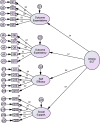Development and evaluation of a new questionnaire to assess social cognitive factors of self-management in patients with type 2 diabetes: a psychometric study
- PMID: 35673441
- PMCID: PMC9167319
- DOI: 10.1007/s40200-022-00999-0
Development and evaluation of a new questionnaire to assess social cognitive factors of self-management in patients with type 2 diabetes: a psychometric study
Abstract
Background: Self-care behaviors are essential to control blood sugar and to prevent mortality and complications of diabetes. The evidence suggests that social cognitive factors play a crucial role in adopting self-care behaviors. This study aimed to develop and examine the psychometric properties of the Diabetes Self-Management Questionnaire based on the social cognitive theory (DSMQ-SCT).
Methods: The present methodological cross-sectional study investigated 460 patients with T2DM referred to the Isfahan Endocrine and Metabolism Research Centre, Isfahan, Iran using the convenience sampling method. We assessed the reliability (internal consistency), content validity, convergent validity and construct validity. Construct validity was evaluated using exploratory factor analysis (calibration sample = 230) and confirmatory factor analysis (validation sample = 230).
Results: In the EFA with the varimax rotation, we extracted four factors that could explain 65.9% of the total variance of the DSMQ-SCT scale. The CFA exhibited a satisfactory fit level for the four-factor structure extracted from the EFA with the following measures. CFI: .971, IFI: .971, NFI: .942, TLI: .966, RMSEA: .046).Internal consistency was good (Cronbach's alpha coefficient for the whole scale: 0.88; the subscales: 0.85 to 0.92). The convergent validity showed significant negative correlations between DSMQ-SCT subscales and HbA1c.
Conclusion: DSMQ-SCT is a valid and reliable instrument to assess social cognitive factors associated with self-management behaviors in patients with T2DM. Therefore, this instrument can be used in both future research and clinical practices.
Keywords: Diabetes; Factor analysis; HbA1c; Psychometric; SCT; Self-Management.
© Springer Nature Switzerland AG 2022.
Conflict of interest statement
Competing interestsThe authors declare that they have no competing interest.
Figures
References
-
- Shaw JE, Sicree RA, Zimmet PZ. Global estimates of the prevalence of diabetes for 2010 and 2030. Diabetes Res Clin Pract. 2010;87(1):4–14. - PubMed
-
- Diabetes Federation International . IDF Diabetes Atlas 2019. 9. International Diabetes Federation. Brussels: IDF; 2019.
-
- Mogre V, Johnson NA, Tzelepis F, Hall A, Paul C. Barriers to self-care and their association with poor adherence to self-care behaviours in people with type 2 diabetes in Ghana: a cross sectional study. Obes Med. 2020;18:100222.
-
- Ansari-Moghaddam A, Setoodehzadeh F, Khammarnia M, Adineh HA. Economic cost of diabetes in the Eastern Mediterranean region countries: a meta-analysis. Diabetes Metab Syndr Clin Res Rev. 2020;14(5):1101–1108. - PubMed
-
- Simmons D, Lillis S, Swan J, Haar J. Discordance in perceptions of barriers to diabetes care between patients and primary care and secondary care. Diabetes Care. 2007;30(3):490–495. - PubMed
LinkOut - more resources
Full Text Sources
Miscellaneous


